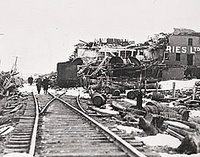 During my linguistic studies, I came to understand the plight of lesser-spoken languages. I just heard about an ongoing program, The Rosetta Project, that is attempting to catalog the world's languages and provide a means of resurrecting them when nearing, or after the point of, extinction.
During my linguistic studies, I came to understand the plight of lesser-spoken languages. I just heard about an ongoing program, The Rosetta Project, that is attempting to catalog the world's languages and provide a means of resurrecting them when nearing, or after the point of, extinction.Unfortunately, American English is quickly becoming the world's lingua franca, and I'm not too pleased. News like this only makes American schoolchildren more adamant that they do not need to learn a second language because "everybody speaks English".
The thing to remember in all of this is that every dominant language eventually falls. Look at Ancient Greek & Latin. French is gradually declining as a dominant language, although this does not mean that its study should be forsaken. It takes many generations of increasingly declining usage to lessen the dominance of a language.
In short, the Anglo invasion of the world will eventually become a fallen empire, leaving room for a new language to usurp it. I'm betting on one of the Asian languages (Chinese? Japanese?).
English is now dominant, but it will not remain so. I am reminded of Thomas Cole's series of paintings entitled The Course of Empire that shows the path that all empires take, from pastoral beginnings to fire-and-brimstone decimation and back to nature once again. This, too, shall pass.
Photo: Thomas Cole, The Course of Empire: Desolation 1836. From his series The Course of Empire




